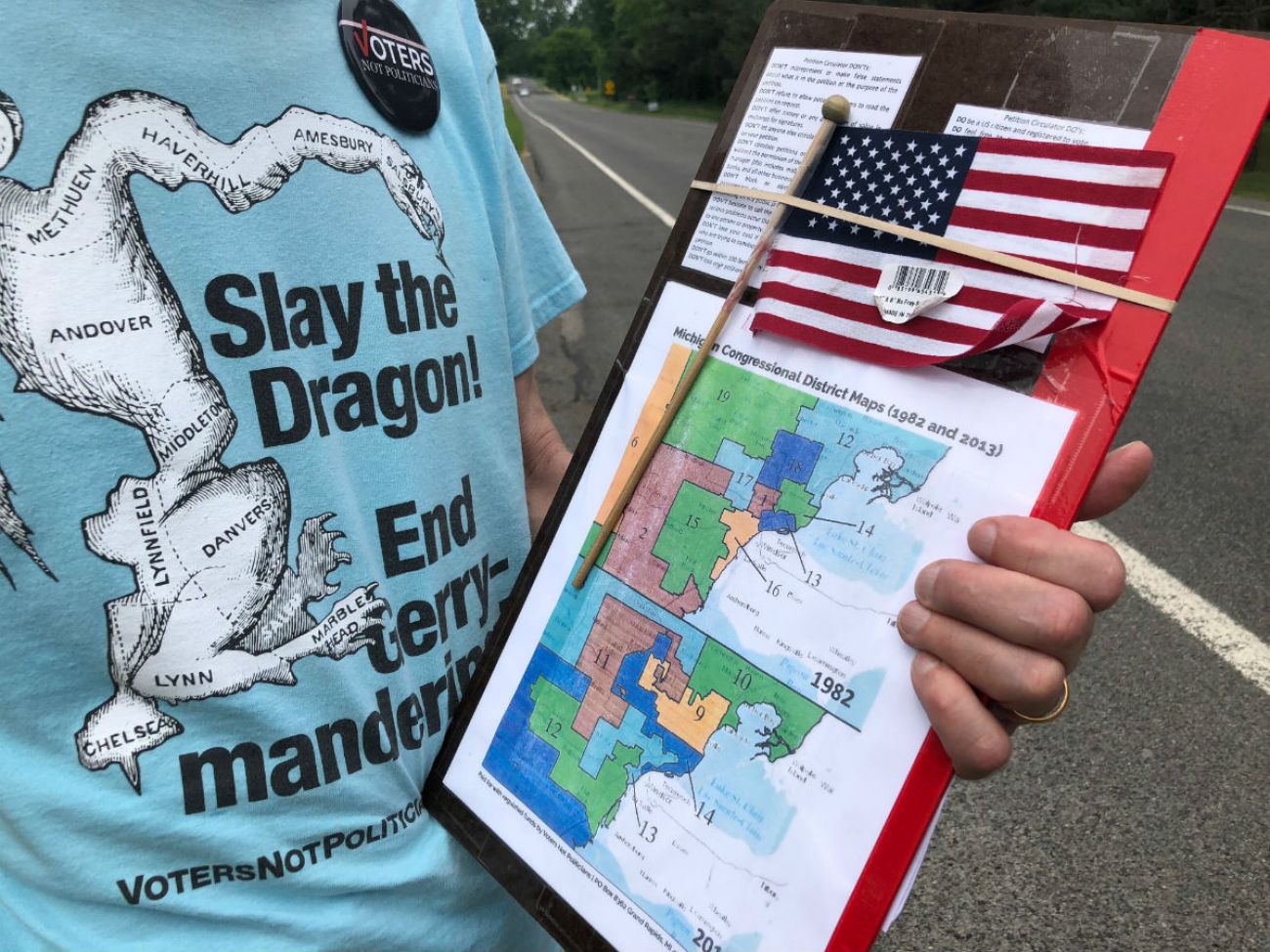Gerrymandering settlement would give Michigan Dems hope, GOP despair


April 25, 2019: Michigan’s political districts illegally gerrymandered, court rules
Update: Expert testifies gerrymandering in Michigan is worse than almost anywhere
Feb. 5, 2019: Michigan Republicans defend political maps as gerrymandering trial opens
Feb. 4, 2019: New emails show Michigan GOP used maps to consolidate Republican power
Feb. 1, 2019: Federal court scuttles Michigan gerrymandering deal, rejects trial delay
Update: Jocelyn Benson seeks to settle gerrymandering suit by redrawing House seats
A possible settlement in a federal lawsuit over Michigan’s political districts is giving Democrats hope of regaining the state Senate and causing heartburn for Republicans.
Last week, new Secretary of State Jocelyn Benson, a Democrat, announced she is in talks with the League of Women Voters to end a lawsuit over Michigan’s 2011 redistricting process before trial is set to start Feb. 5.
Court documents filed Saturday indicate the compromise involves asking the court to agree to redraw fewer than 34 of the state’s 162 congressional and legislative districts – a task that legal precedent indicates would fall to the state’s Republican-controlled Legislature.
Special elections in newly redrawn districts would follow in 2020, including perhaps those in the state Senate which Republicans now control 22-16. The suit alleges 10 of the districts are unconstitutional, and seven of those are now held by Republicans.
The prospect of special elections emerged after Benson took office Jan. 1 from Republican predecessor Ruth Johnson, whose lawyers had sought to delay and dismiss the case.

The secretary of state is the main defendant in the case brought by former Michigan Democratic Party chairman and attorney Mark Brewer. Settlement talks began around Jan. 10, according to court documents.
“This is pretty remarkable. I’ve never seen anything comparable… It’s a pretty stark example of what can happen when an election result changes in the middle of a lawsuit,” said David Daley, a senior fellow at FairVote, a nonpartisan group that advocates nationally for electoral reforms.
“The new secretary of state appears to be saying ‘let’s make a deal’ because there’s enough evidence the state will lose. … But it’s also in her political interest to come to that conclusion.”
Related Michigan gerrymandering stories:
- How a shadow Republican group gerrymandered Michigan – sparking a backlash
- Michigan secretary of state wants to settle gerrymandering lawsuit
- Gerrymandering is dying in Michigan. Of old age. No joke.
- Michigan gerrymandering trial on for February; court cites ‘profound’ bias
- Proposal to end gerrymandering resonated in red and blue Michigan
New maps would only last for the 2020 election. The next year, a citizens commission created by voters through a referendum passed in November would draw new districts for the 2022 election and thereafter.
Benson last week said she is moving to settle to ensure a fair election and save taxpayers money on a trial that Michigan would certainly lose.
But Republicans are howling at the prospect of a settlement by Democrats Brewer and Benson, with the state Republican Party on Tuesday launching an online campaign accusing them of orchestrating “the greatest partisan power grab in Michigan history.”
In court papers, attorneys representing GOP House Speaker Lee Chatfield and Michigan’s Republican congressional delegation claim they were blindsided by the talks and filed a motion Tuesday questioning her ability to remain as a defendant in the case.
“I don’t want to get in a beef with the lady (Benson), but do something positive,” Sen. Pete Lucido, R-Shelby Township, told Bridge Magazine.
“What’s happened is done. The people who were elected in 2011 aren’t even in office anymore. Don’t address one wrong by committing another.”
In November, Lucido won by a landslide, 62-38, capturing District 8 in Macomb County. An email uncovered in the federal case shows a Senate staffer had bragged it “would certainly be a Republican district” after lines were redrawn in 2011.
Lucido noted the state constitution mandates Senate seats are elected every four years to terms that run concurrent with the governor.
“If judges bless a settlement that goes against the constitution, then we are all in trouble,” Lucido said.
“Is anyone forgetting about the will of the people? They elected Pete Lucido to serve a four-year term.”

Precedent elsewhere in country
Special elections and shortened terms would be neither unconstitutional nor unprecedented, said Justin Levitt, a professor at Loyola University Law School in Los Angeles, an expert on redistricting.
In 2016, for instance, Florida state senators had terms trunctuated and stood for re-election when districts were redrawn because of the state’s anti-gerrymandering law.
“I don’t think there’s anything unconstitutional … if the settlement is a good-faith agreement undertaken in order to prevent liability (for partisan gerrymandering) under the federal constitution,” Levitt wrote Bridge in an email.
Other states, including North Carolina, also have had court-ordered special elections because of gerrymandering claims. Some have occurred several years after the lines were drawn, Levitt noted.
In Michigan, special elections would not affect terms of members of the state House or the congressional delegation, who stand for election every two years.
But elections in redrawn Senate seats would coincide with the presidential election in 2020, rather than during midterms when turnout is generally far lower (63 percent in 2016 compared to 42 percent in 2014.)
Higher turnout typically favors Democrats.
“I’m just strapped in and along for the ride. We all serve at the pleasure of the voters,” Sen. Jeff Irwin, D-Ann Arbor, told Bridge.
He was elected in November to District 18, which includes Washtenaw County and Ann Arbor.
The League of Women Voters’ suit challenges his district as well, claiming it was drawn by Republicans to heavily favor Democrats (Irwin won 76-21 percent.)
That’s a tactic known as “packing,” concentrating voters of one party into single districts to dilute their numbers in neighboring ones. The district adjacent to Irwin, District 22 in Washtenaw and Livingston counties, favors Republicans but by a lesser degree. Republican Lana Theis won in November 56-42.
“This could become my problem (if districts are redrawn) but it’s not something I can influence or even try to,” Irwin said.
A special election “would be a lot of work, but it’s not something I’m going to focus on,” Irwin said.
On Tuesday, Theis was one of three GOP senators in districts targeted by the lawsuit to file a motion in federal court seeking to intervene in the case. She was joined by Jim Stamas of Midland and Ken Horn of Frankenmuth.
Another district targeted in the suit, District 14 in Genesee and north Oakland counties, is represented by Ruth Johnson, the former secretary of state.
She was elected to the Senate in November as she prepared to leave her state post because of term limits.
A lawsuit settlement raises the possibility that Johnson, a one-time defendant in the case, would have her term cut short because of it.

‘Domino effect’ and ‘chaos’
Besides the 10 Senate seats, the suit challenges nine of Michigan’s 13 U.S. House districts and 15 in the state House.
An affidavit by Joseph Yeager, an attorney for the League of Women Voters, filed in court this weekend indicates any compromise with Benson would involve fewer than the 34 total districts challenged in the case.
How that is possible remains a mystery, since redrawing one district “impacts the next district and there is a domino effect until you have to redraw all the districts in the state,” said Richard Czuba, a pollster and founder of the Glengariff Group
“Until we have some sense of how these lines are going to be redrawn, it’s a great unknown and wildcard,” he said.
“Will it cause uncertainty and will it be chaotic? Absolutely. This would be largely unprecedented in Michigan.”
Another complication: The populations of many Michigan districts have presumably changed since they were drawn after the 2010 Census.
Each Senate district is supposed to have about 212,000 to 260,000 residents. Would redrawn districts reflect the population of nine years ago or today?
“It’s an excellent question, and there’s no one bulletproof answer,” Levitt, the Loyola redistricting expert, wrote to Bridge, adding that “courts tend to abide by the legal fiction that the last Census are sufficiently reliable for legal purposes throughout the decade.”
Republican consultant Stu Sandler said drawing districts is “incredibly complicated” and involves a host of legal requirements.
He echoed arguments made by Republican attorneys in the case who want the case delayed until after the U.S. Supreme Court decides two gerrymandering cases this year, one involving districts that favored Democrats in Maryland and another that gave Republicans an edge in North Carolina.
A decision on those cases is due by June, a few months after the Michigan case would be decided if it were to go to trial.
“Jocelyn Benson is trying to rig elections to favor Democrats,” Sandler said.
“This is an eminently political process, and Mark Brewer and Jocelyn Benson are demonstrating it. They’ve been partisans their entire lives. .. This settlement is illicit and outrageous. They are not involving Republicans.”
In a motion Tuesday, Republican attorneys sought a delay in the case to obtain emails, texts and other communications between Brewer and Benson before what they termed a "clandestine settlement."
"The fact that Secretary Benson has potentially reached a settlement with Plaintiffs only days after being recognized by the Court ... creates serious doubt regarding her continued standing in the case," the motion read.
Benson spokesman Shawn Starkey said she spent weeks reviewing the case before concluding the state would lose.
"As the state’s chief election officer and one of the nation’s leading experts in election law, Secretary Benson is deeply committed to ensuring our districting process is fair, nonpartisan, and complies with the requirements of state and federal law," Starkey said. "That’s precisely what the voters elected her to do. It’s laughable to suggest otherwise."
Brewer, meanwhile, filed a motion over the weekend including emails that indicate Republican attorneys were in fact made aware of the settlement talks. The motion alleges GOP attorneys elected not to participate in the discussion.
“There is no such thing as a secret settlement. Any settlement would have to be approved by the court,” Brewer told Bridge, declining further comment.
Courts could hear objections before signing onto the settlement, legal experts say, and the Legislature would get the first opportunity to redraw lines within a specified time.
Otherwise, the court also could appoint a special master to draw the districts.
Even more Michigan gerrymandering stories:
- Gerrymandering is dying in Michigan. Of old age. No joke.
- Gerrymandering 101: How voters favor Dems, but GOP keeps Michigan Legislature
- These maps show how Michigan Republicans kept power despite blue wave
- Emails: Michigan Republicans brag that redistricting ‘protects incumbents’
- These Republican insiders split $1 million to design and defend Michigan 2011 map
- Democrats blast Michigan Chamber over gerrymandering emails
- Emails suggest Republicans gerrymandered Michigan to weaken ‘Dem garbage’
- Voting results deliver on Michigan Chamber VP’s gerrymandering promise
- Maps show how gerrymandering benefitted Michigan Republicans
See what new members are saying about why they donated to Bridge Michigan:
- “In order for this information to be accurate and unbiased it must be underwritten by its readers, not by special interests.” - Larry S.
- “Not many other media sources report on the topics Bridge does.” - Susan B.
- “Your journalism is outstanding and rare these days.” - Mark S.
If you want to ensure the future of nonpartisan, nonprofit Michigan journalism, please become a member today. You, too, will be asked why you donated and maybe we'll feature your quote next time!